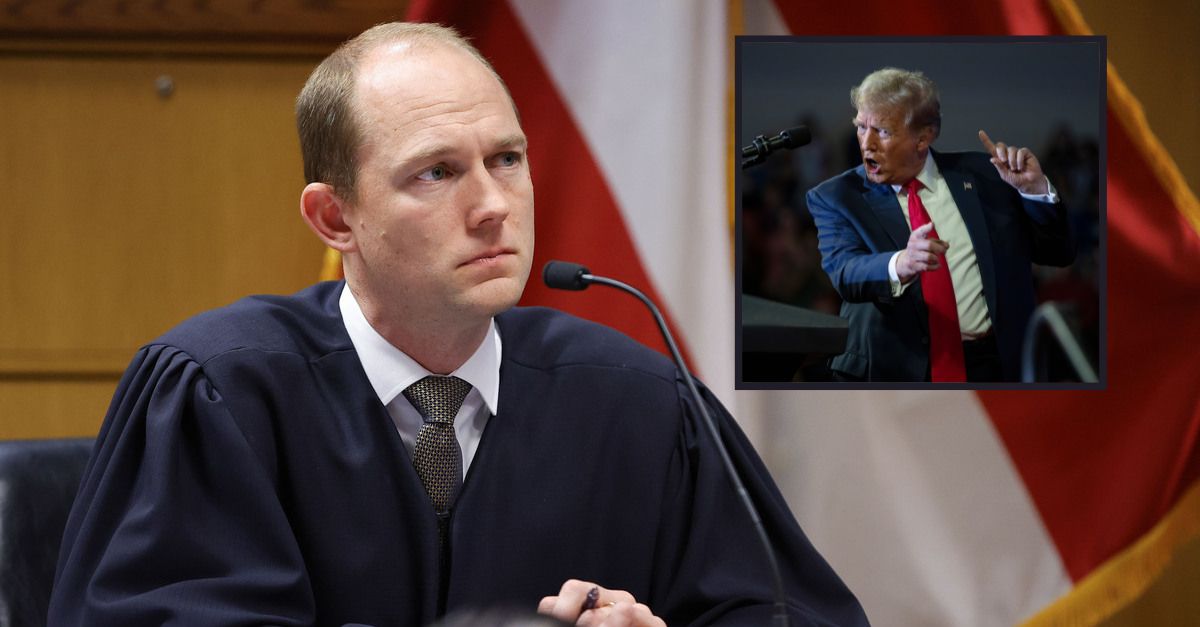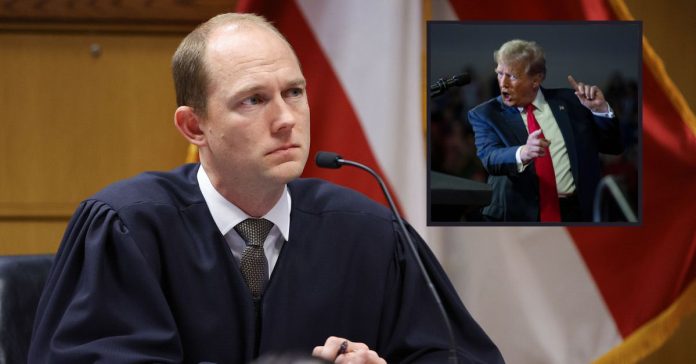
Fulton County Superior Judge Scott McAfee presides in court, Friday, March, 1, 2024, in Atlanta. (AP Photo/Alex Slitz, Pool). Inset: Donald Trump speaks at a Get Out The Vote rally at Coastal Carolina University in Conway, S.C., Saturday, Feb. 10, 2024. (AP Photo/Manuel Balce Ceneta)
The Georgia judge overseeing the racketeering (RICO) and election interference case against Donald Trump on Wednesday dismissed six of the counts in the indictment because they lacked relevant details.
Fulton County Superior Court Judge Scott McAfee issued the ruling in a nine-page order responding to special demurrers. Along with the 45th president, co-defendants Rudy Giuliani, John Eastman, Mark Meadows, Ray Smith, and Robert Cheeley received limited relief.
Overall, counts two, five, six, 23, 28, and 38 of the 41-count indictment were quashed — leaving most of the co-defendants still facing several counts, except for Meadows, who now only faces one count.
The state can re-file the charges, even if the statute of limitations has passed, due to a six-month grace period in Georgia law, the court explained in a lengthy footnote.
Each of the defective counts were “similarly structured,” according to the court. Those counts alleged the defendants “solicited” elected officials in the Peach State — including state representatives, state senators, and the secretary of state — to “violate” their oaths of office.
The alleged conduct in question occurred on specific dates in late 2020 and early 2021, prosecutors wrote in the charging instrument. But the details regarding the defendants’ alleged actions were not the problem with the indictment on those six counts, the court observed.
“The Court’s concern is less that the State has failed to allege sufficient conduct of the Defendants — in fact it has alleged an abundance,” McAfee’s order reads. “However, the lack of detail concerning an essential legal element is, in the undersigned’s opinion, fatal.”
In other words, the dismissed counts are just threadbare allegations that the defendants asked three kinds of elected officials to violate their oaths. And, in each of the alleged instances, the oaths in question — the U.S. and Georgia Constitutions — encompass quite a bit.
The indictment, McAfee says, incorporates references that are “so generic as to compel this Court to grant” dismissal.
“On its own, the United States Constitution contains hundreds of clauses, any one of which can be the subject of a lifetime’s study,” the opinion reads. “Academics and litigators devote their entire careers to the specialization of a single amendment.”
The Georgia Constitution adds additional complexity to the issue, the court says, because, despite some similar language, it “has been interpreted to contain dramatically different meanings.”
In other words, the six dismissed counts did not contain enough details about what the underlying offense actually was.
“They do not give the Defendants enough information to prepare their defenses intelligently, as the Defendants could have violated the Constitutions and thus the statute in dozens, if not hundreds, of distinct ways,” the court’s order reads.
Notably, however, the defendants also moved to dismiss the corresponding overt acts related to the six dismissed counts. These overt acts, in a feature of RICO law, form part of the basis of the broader RICO conspiracy alleged in the first count of the indictment.
McAfee declined to dismiss those overt acts — citing lower pleading standards — as they apply to the alleged RICO conspiracy.
In real terms, this leaves a seeming legal oddity.
Trump and Meadows no longer face any specific criminal charges for the infamous phone call in which Trump asked Georgia Secretary of State Brad Raffensperger to “find 11,780 votes” in order to overturn Joe Biden’s electoral win in the state. At the same time, the alleged crime committed during the phone call can still be used to argue there was an overarching conspiracy to overturn the election — even though this alleged crime lacks enough detail to stand on its own.
Have a tip we should know? [email protected]

